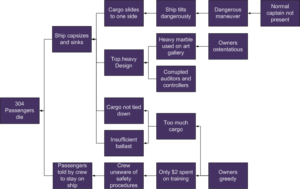The Agile Manifesto has borne not just fruit, but complete orchards and plantations. But as we know, that document intended to be a manifesto for agile software development. Let us examine how that manifesto may be adapted for service management. What would a Manifesto for Service Management Agility be?1 The Manifesto for Agile Software Development […]
problem
Problem Management Metrics
Consider the case in the callout. While reading it, think about what might be wrong with that way of measuring problem management.
Be proactive like a true pro
Some organizations consider proactive problem management to be the work of resolving problems when they are not currently causing any incidents. This understanding is in direct conflict with an alternative interpretation, wherein proactive problem management concerns the identification and resolution of problems before they have caused any incidents at all.
The Sinking of the Sewol and “Root Cause” Analysis
O why why why why why? Ohno Taiichi provides an oft-quoted example of using the five whys to perform root cause analysis. His neat little scenario of making durable improvements in the operation of an industrial machine gives a misleading view of the reality of understanding the causes of problems. An analysis of the sinking […]
Problem Workarounds and Incident Resolutions
The Scope of this Discussion When a problem is identified reactively, it means that one or more incidents have occurredand it has been decided to take note of and perhaps investigate their underlying causes. I exclude from this discussion both the proactively identified problems—the problems identified before any related incidents have occurred—and those organizations that […]
What is a problem?
Although troubleshooting and the definitive elimination of faults has a long history, the particular innovation of ITIL® 2 was to recommend treating problems and incidents as two separate entities, each with its own life-cycle. This advice had led to a series of confusions and ambiguities, many of which have still not been resolved among the […]



